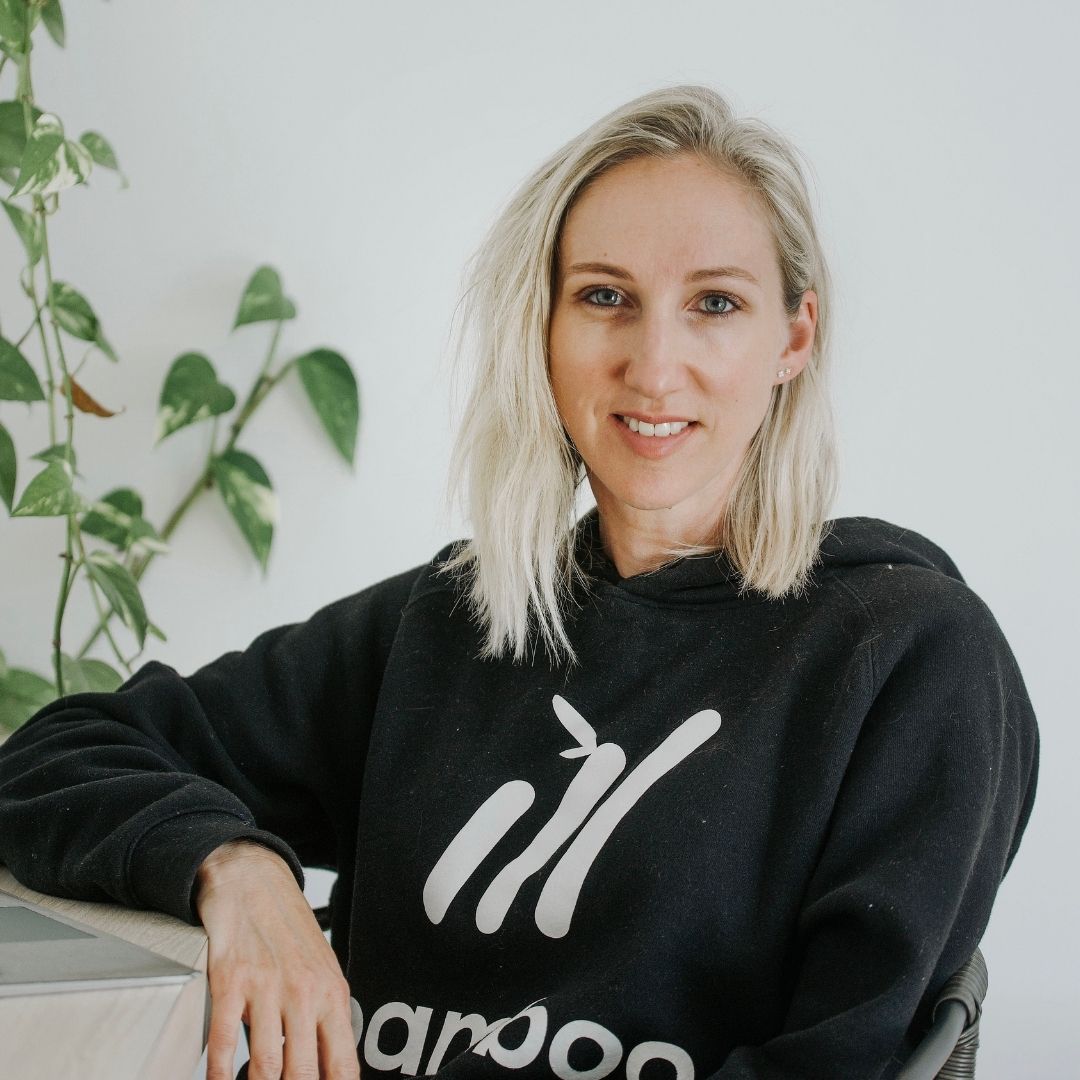So you now understand the basics of the blockchain, and we’ve had a look at how Bitcoin came to be. So it’s time to look at one of the other big coins making waves, Ethereum. In this episode they talk about how Vitalik Buderin created the coin, how its functionality is different to Bitcoin, and the possibilities on the horizon with this blockchain.
Download the Bamboo app and use code CURIOUS for $10 in ETH.
Follow Crypto Curious on Instagram, or send the team an email with all your thoughts here.
*****
In the spirit of reconciliation, Equity Mates Media and the hosts of Crypto Curious acknowledge the Traditional Custodians of country throughout Australia and their connections to land, sea and community. We pay our respects to their elders past and present and extend that respect to all Aboriginal and Torres Strait Islander people today.
*****
Crypto Curious is a product of Equity Mates Media.
All information in this podcast is for education and entertainment purposes only. Equity Mates gives listeners access to information and educational content provided by a range of financial service professionals. It is not intended as a substitute for professional finance, legal or tax advice.
The hosts of Crypto Curious are not aware of your personal financial circumstances. Equity Mates Media does not operate under an Australian financial services licence and relies on the exemption available under the Corporations Act 2001 (Cth) in respect of any information or advice given.
Before making any financial decisions you should read the Product Disclosure Statement and, if necessary, consult a licensed financial professional.
Do not take financial advice from a podcast.
For more information head to the disclaimer page on the Equity Mates website where you can find ASIC resources and find a registered financial professional near you.
In the spirit of reconciliation, Equity Mates Media and the hosts of Crypto Curious acknowledge the Traditional Custodians of country throughout Australia and their connections to land, sea and community. We pay our respects to their elders past and present and extend that respect to all Aboriginal and Torres Strait Islander people today.
Tracey: [00:00:21] Welcome to the crypto curious podcast designed to help you navigate the dynamic world of digital assets. I'm your host, Tracey. And as always, I'm joined by my colleagues, Blake and Craig. Hey, guys.
Blake: [00:00:34] Hey Tracey, great to be here.
Craig: [00:00:35] Hey, Trace. Great to be here.
Tracey: [00:00:37] So last episode we talked about Bitcoin, the why and the what. So if you missed that one, make sure you go back and catch up. Today is all about Ethereum. We know Ethereum was the first investment where Craig and I really understood the power of decentralisation and crypto currencies. I always say that if bitcoin is the calculator, then a theory would be the smart phone. But how did the Syrian begin? Ethereum was created by Vitalik Buterin, a Russian Canadian programmer and crypto researcher. He came up with the idea for a theorem in 2013, which finally went live in 2015. Vitalik was only 19 when he founded the Ethereum.
Blake: [00:01:18] The story goes that Vitalik was hanging out with a group of crypto enthusiasts, and he came up with an idea of Ethereum, which is a general purpose blockchain. And everyone thought he was crazy. He was so ambitious that no one thought it was possible. And I think because of his age and potentially his naivete, he's the only one that embarked on such a project. And now Ethereum is, you know, worth, I think, close to 500 billion US dollars.
Tracey: [00:01:48] Well, that's madness. I definitely think it's got something to do with the age at 19, and most of us are out there partying, having fun and he's out there thinking about Ethereum.
Craig: [00:01:57] Yeah, he first started writing bitcoin articles for a magazine in 2011, so he would have been 16 17 at that time, and he was writing it for five bitcoin per article, which was $3 50 at the time, which wasn't a good deal, but now it's, you know, over 500000. So not too bad for writing articles.
Tracey: [00:02:17] That's the creator's backstory. But what exactly is a theory? I mean, how does it work? The easiest explanation of a theorem is that it's a global computer running on tens of thousands of other people's computers.
Blake: [00:02:30] This computer is different from other computers as it's built on top of blockchain technology. Ethereum allows anybody to write code for accounting purposes. On top of the Ethereum blockchain. Whereas bitcoin's sole purpose is to transfer value across the internet, where Ethereum's purpose is to do more complicated tasks.
Tracey: [00:02:51] Just to recap that bitcoin is a single purpose, blockchain and Ethereum is a general purpose blockchain which can be built upon. So let's explore that a little further. The most important pillars of the blockchain can be broken down into three parts decentralisation, transparency and immutability. I think it's important that we understand that these pillars to truly grasp the nature of how special a theorem will become. Craig, can you give us a brief overview of these three?
Craig: [00:03:21] Yeah, we explain a little bit about the blockchain episode two, but here's a little recap. So the three parts you mentioned decentralisation, that means that no one person or entity has control over the data. It's not centralised. No central banks, no payment providers and a blockchain allows a data to be stored, managed and recorded on a network of computers around the world. The second one transparency is when the data is impossible to be changed or altered. Now, every transaction on the blockchain is transparent. It's not. Craig sends Blake one bitcoin. It's one three four eight sends eight seven six four one Bitcoin. So it's transparency in a way, but you also can't say who it is. And the last part is immutability. The data cannot be change or altered as soon as I send Blake a bitcoin. That's it. And it stands forever.
Tracey: [00:04:13] Yeah. Thanks, Craig. You might be wondering how can I assume actually operate if it's not owned or operated by a central authority or entity? And that's where Aether comes in. A lot of people actually use the words Aether or Ethereum interchangeably, but these are actually two different things.
Craig: [00:04:32] A theorem, as we explained, is the blockchain. Aether is the Ethereum's blockchain's native token. Aether itself is similar to bitcoin, and it can be used as a payment mechanism around the world. However, it's also designed to fuel the Ethereum network, which means you pay your transaction fees in Aether. So Ethereum is the car, Aether is the gas. The Aether token powers the use of smart contracts, which allows anyone to build applications on top of it. Yeah.
Blake: [00:04:59] Importantly, Ethereum has its own coding language, and not everyone can build on top of it. And the language is called solidity, which is a pretty cool name. But these developers are in pretty high demand at the moment.
Tracey: [00:05:13] So these these developers for solidity is that just for these particular? Is it just for Ethereum?
Blake: [00:05:20] The. That's right, but there's many other blockchains that are Ethereum compatible, so it is applicable elsewhere.
Tracey: [00:05:26] OK? And Craig mentioned smart contracts too, which is another bit of a jargon alert. Blake, can you dial it down for us like we're five again? What's the lowdown on smart contracts? Yeah, a
Blake: [00:05:37] smart contract is really just a piece of code with certain conditions. An example of how this could work is if I was using Aether to pay my rent, I could code into the transaction that when I transfer it, the bills are then paid automatically once the transfer is received. For example, the water bill or the electricity bill. In other words, it's programmable money.
Craig: [00:06:06] That's a great example. I don't know many five year olds paying rent, but I think that's a really good analogy. But the analogy that I love the most is a vending machine. So if you think about a vending machine, you put your money in, you press one B for your packet of Doritos. Those are the conditions of your $5. You put the $5 in, you set your conditions and then all of a sudden you're enjoying a bag of Doritos that is, in its essence, a smart contract.
Tracey: [00:06:35] Wondered where you're going with your vending machine analogy there. Okay, so Ethereum is a network that can be built upon. It has its own currency called Aether, and people can write programmes upon it. Let's dive into how this differs from the properties of bitcoin that we've discussed in last episode. But first, let's hear from our sponsors. Ethereum, so let's dive into how this differs from the properties of bitcoin that we've discussed last episode.
Craig: [00:07:03] Yeah, bitcoin's primary use case is that it's a store of value and a digital currency. Aether can also be used as a digital currency and a store of value. But the Ethereum network makes it possible to create and run applications, also known as DApps, which stands for decentralised apps.
Tracey: [00:07:21] So you can get an app on the Apple Store, the Google Play Store and you can get DApps on a Etherium Blake. Do you want to give us some more information on DApps?
Blake: [00:07:31] DApps are decentralised applications build on top of Ethereum or other blockchains. An example could be a voting tool where you could vote for things and your vote is then recorded on the blockchain. How this could work practically is, you know, in a general election for your national government. Instead of having to go in to the voting booth and then putting it on paper, you could instead cast your vote onto the blockchain and verify your identity by signing a transaction. And in this sense, there's no need of trusting a centralised authority like a government agency to count those votes or you would have to do is trust that the blockchain has integrity. And, you know, we're in a fortunate situation where the blockchains that exist today let Bitcoin. Ethereum have never been compromised.
Craig: [00:08:23] To make it easy, I've tried to compare current companies to an Etherium application. The best comparison would be OpenSea and eBay. Now we know eBay is an online marketplace to buy physical goods on the internet. You need an I.D. and a payment method to be able to interact with eBay. Now, OpenSea is very similar, but it's an online marketplace for digital art, also known as NFTs, which you will get into later. But let's pocket for now. OpenSea is what we would call a DApp, where all you need is Nithya and Wallet to interact with it. And now digital assets can be traded on OpenSea with no middleman required.
Tracey: [00:09:00] And speaking of OpenSea, Craig, I was reading last week that for the month of August, they actually transacted three billion dollars worth of revenue in the one month. And what's pretty amazing about that? It was actually only 200000 addresses that were running that amount through which, you know, that's that's huge money. That's huge. Let's let's roll on now with a bit of a pros and cons similar to what we did with bitcoin. So who's going to take the who's going to take the hit and who's going to do the cons for Ethereum?
Blake: [00:09:31] I'll take the pros this time trace.
Tracey: [00:09:33] Yeah, it's only fair. Alright, let's let's jump in with the pros for Ethereum over to you, Blake.
Blake: [00:09:38] Now, Ethereum is my favourite cryptocurrency, and there's many reasons for this. And firstly, it's because it has the biggest developer community now in this space. So important that you have tens of thousands, if not hundreds, of thousands of developers contributing to the ecosystem, creating value every day. And this sense. That's why Ethereum is the biggest general purpose blockchain. Following on from that, it has the biggest network effect because it has sub industries from lefty's to decentralised finance and gaming, which all contribute to the success of the wider blockchain and its applicability to real world use cases. And Ethereum's was the first to market and has such a strong brand, has a great story with Vitalik Buterin is still contributing to the project to this day. And what's most exciting from an investment point of view is that they've just implemented something called a burn, which means that the amount of Ethereum is reducing over time every day. Ethereum is getting burnt, and in theory, this should increase its value over time. Yeah.
Tracey: [00:10:46] Nicely done, Craig. Give us your best shot.
Craig: [00:10:49] Well, that was pretty good. Make sure you have
Blake: [00:10:52] our theory,
Tracey: [00:10:53] but not far more theory, not financial or not
Craig: [00:10:56] financial advice. I'm going to take the cons, though. Someone's got to do it. But I do have a compelling argument, actually, and one of them is gas fees. If you've ever used a theorem during the OpenSea August that Tracy mentioned, the gas fees were ridiculous, the gas fees are used as a bidding to prioritise your transaction fee. Now, a block on the blockchain is only a certain size, so people are spending, you know, upwards of thousands of dollars to get their transaction in the block to get prioritising and go through quickly. This comes with lots of issues. One, it favours the rich. You know, people like me that are only buying NFTs that are, you know, less than one ETH. It's not economically worth using a theorem because you have to pay double sometimes to even get your transaction through. And now, since Ethereum's come out, there's been new blockchains like Solana, Cosmos, they have. Speeds at a sense, not Dollars. And this is better for real world application. Now my second point would be the custom coding language that Blake mentioned. Now we're relying on devs to want to use this coding language. What if developers go somewhere else and all the good developers want to build on Solana? So that's an issue. And my third and final con is that it's slow use Ethereum versus Solana or Cosmos. A theory might take five or 10 minutes to clear, whereas Solana is almost instant. So there are some concerns that I have.
Tracey: [00:12:33] Yeah. And just to be clear, we're working on all those three points and they will be rectified very soon. So yeah, none of that. We're just giving you the abridged version on a Cirium, which may well become the new version of the internet, right? Have you got any final thoughts for them?
Blake: [00:12:50] And that's really part of the vision of a theorem. It's a global computer that anyone can use, and what we will find in the future is that our most important software systems globally will be will be built on blockchains like Etherium and due to their intrinsic qualities that Craig went over. Systems like settlements, exchange trading platforms, remittance data storage, election voting will also transition across to platforms like Theorem. And it creates an ecosystem of innovation and business models that previously haven't been possible. And in this sense, it's really like a new version of the internet with its own native currency.
Tracey: [00:13:35] Yeah, I think you're right, and I think, you know, to rounded out technology doesn't go backwards. You know, the internet was one of the fastest adoption of any technology aside from the mobile phone. And we're growing at twice the speed of that. Let's leave it there for today, but we want to know what you want to know about crypto, specifically any questions about Ethereum. So send us an email at podcast at Git Bamboo Dot Io or follow us on social media. All those details are in the show notes below, and don't forget to write and review us on your podcast app. And that's it for crypto. Curious? Thanks so much for joining us. I'm Tracey.
Blake: [00:14:14] I'm Blake.
Craig: [00:14:14] I'm Craig.
Tracey: [00:14:15] See you later!
 Spotify
Spotify Apple Podcasts
Apple Podcasts YouTube Music
YouTube Music

